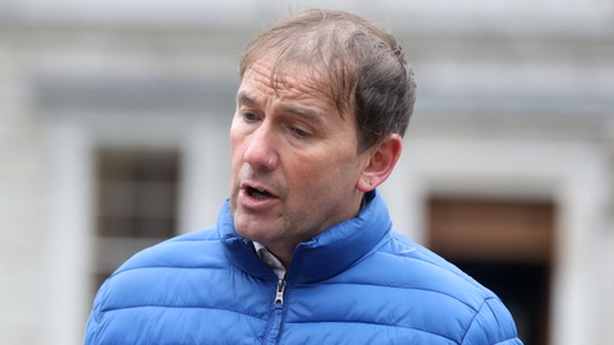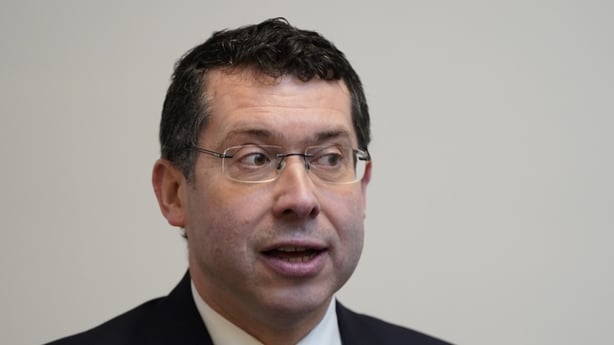People Before Profit TD for Dublin Mid-West Gino Kenny is nothing, if not dogged.
At every opportunity Mr Kenny has made the case for assisted dying legislation to be passed by the Oireachtas and he was back campaigning on Friday.
Deputy Kenny has drafted a new bill which incorporates many of the recommendations of an Oireachtas committee report published in March, which called for assisted dying to be legalised in certain restricted circumstances.
The People Before Profit TD’s plan is to introduce the bill in the coming weeks, even though he recognises that this Coalition Government is unlikely to adopt it.
Minister for Finance Michael McGrath signalled that stance when he said: “It strikes me as ambitious that it could be done in the remainder of this Government’s life.”
Unperturbed, Mr Kenny is advancing the legislation anyway: “It’s possible the Government could adopt the bill… and legislate in the lifetime of the Government.
“Whoever is in Government, they have an obligation to put preparatory work in place on how to legislate for voluntary assisted dying in Ireland.”

But assisted dying is controversial.
The Oireachtas committee’s report did not garner unanimous support.
Just nine of the 14 committee members backed it while another TD, Sinn Féin’s Pa Daly, abstained.
Dissenters, including TDs Michael Healy-Rae and Robert Troy alongside Senator Rónán Mullen, produced a minority report opposing the introduction of assisted dying.
Introducing a bill into the Dáil would inevitably trigger opposition within the Government’s own ranks.
Former Minister for Justice Charlie Flanagan has already declared: “I will not be supporting legislation on euthanasia despite my party’s position.
“Instead, I will continue to advocate for assisted living, more palliative care beds, home care teams and… specialist help through hospice care.”
Mr Kenny is going to keep up pressure anyway.
After all, he introduced the Dying with Dignity Bill in 2020, which passed second stage and was the driver for the establishment of the Oireachtas committee.
He also has his supporters.
Also present at Friday’s news conference was assisted dying campaigner, Tom Curran.
He is the husband of the late Marie Fleming, the 59-year-old terminally ill woman living with multiple sclerosis, who challenged the law criminalising assisted suicide.
She lost her case in 2013, when the Supreme Court ruled that the right to life, under Article 40.3.2 of the Constitution, does not have a corollary right to die.
The ruling means that the law, as amended in 1993, remains unchanged: suicide has been decriminalised, but assisting someone to take their own life is an offence punishable up to 14 years in prison.

Also attending the People Before Profit event was Janie Lazer, from End of Life Ireland.
Praising Mr Kenny, she quipped that he had been essential in keeping alive the issue of assisted dying.
Ms Lazer also argued that the Government has a moral obligation to act, not just to consider the committee’s recommendations, but to legislate given there was cross-party support.
Senator Mullen, however, believes it would be “socially damaging” for any Government to legislate on assisted dying as it would “do more harm than good and make more people more vulnerable”.
He said Irish palliative care professionals – doctors, nurses and other healthcare professionals – were strongly opposed to assisted dying at the committee because it “would damage people’s trust in the healthcare system and undermine people’s hope in the face of a challenging diagnosis”.
The committee had heard numerous times, he said, that depression associated with a terminal diagnosis could and does abate once the right supports are in place.
Mr Mullen added that the Irish College of Psychiatrists had said that even if euthanasia or assisted suicide was limited to cases of terminal diagnosis, it would not be possible to prevent people with mental health challenges or depressive illness from getting caught up in it.
The disability sector also expressed concerns.
He contended that a much better approach would be to provide additional resources for positive alternatives, principally expanding palliative care options.
It is no surprise that there is such deep divisions given the profound moral question which assisted dying presents.
Mr Kenny argues that it is “imperative that this issue progresses in the lifetime of this Government” because there is “cross party support for legislative change”.
He told me: “I’m confident this can be done, if there’s political will.”
At this moment in time, however, there does not seem to be the political will to tackle this most difficult of issues.
With a migration crisis, housing crisis, homelessness crisis and healthcare crisis, it would appear this Government has enough on its hands already and is going to leave the issue of assisted dying for the next administration.
Source link
 TG4 TV PC to TV
TG4 TV PC to TV
